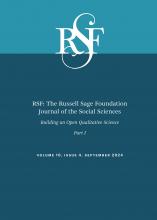Research Article
Open Access
Intersectional Burdens: How Social Location Shapes Interactions with the Administrative State
Theresa Rocha Beardall, Collin Mueller, Tony Cheng
RSF: The Russell Sage Foundation Journal of the Social Sciences September 2024, 10 (4) 84-102; DOI: https://doi.org/10.7758/RSF.2024.10.4.04
Theresa Rocha Beardall
aAssistant professor in the Department of Sociology at the University of Washington, United States
Collin Mueller
bAssistant professor in the Department of Sociology at the University of Maryland, United States
Tony Cheng
cAssistant professor in the Department of Sociology at Duke University, United States

REFERENCES
- ↵
- Alicea, Julio Angel
- ↵
- Asad, Asad L., and
- Matthew Clair
- ↵
- Baekgaard, Martin,
- Kim Sass Mikkelsen,
- Jonas Krogh Madsen, and
- Julian Christensen
- ↵
- Barnes, Carolyn
- ↵
- Barnes, Carolyn,
- Sarah Halpern-Meekin, and
- Jill Hoiting
- ↵
- Besbris, Max,
- Brian McCabe,
- Eva Rosen, and
- Sadie Dempsey
- ↵
- Bleiweis, Robin,
- Diana Boesch, and
- Alexandra Cawthorne Gaines
- ↵
- Bonaparte, Alicia D
- ↵
- Bouek, Jennifer W
- ↵
- Bowleg, Lisa
- ↵
- Bridges, Khiara
- ↵
- Burden, Barry C.,
- David T. Canon,
- Kenneth R. Mayer, and
- Donald P. Moynihan
- ↵
- Camillo, Cheryl A
- ↵
- Cheng, Tony
- ↵
- Cheng, Tony
- ↵
- Collins, Patricia Hill
- ↵
- Crenshaw, Kimberlé
- ↵
- Daminger, Allison
- ↵
- Edin, Kathryn, and
- Laura Lein
- ↵
- Edwards, Frank,
- Kelley Fong,
- Victoria Copeland,
- Mical Raz, and
- Alan Dettlaff
- ↵
- Ellen, Ingrid Gould,
- Katherine O’Regan, and
- Sarah Strochak
- ↵
- Elliott, Sinikka,
- Sierra J. Satterfield,
- G. Solorzano,
- Sarah Bowen,
- Annie Hardison-Moody, and
- Latasha Williams
- ↵
- Fee, Kyle,
- Sloane Kaiser, and
- Keith Wardrip
- ↵
- Fielding-Singh, Priya,
- Elizabeth Talbert,
- Lisa Hummel, and
- Lauren N. Griffin
- ↵
- Fields, Corey D.,
- Rahsaan Mahadeo,
- Lisa Hummel, and
- Sara Moore
- ↵
- Fox, Ashley,
- Wenhui Feng, and
- Megan Reynolds
- ↵
- Gándara, Denisa,
- Rosa Acevedo,
- Diana Cervantes, and
- Marco Antonio Quiroz
- ↵
- Garcia, Marc A.,
- Patricia A. Homan,
- Catherine García, and
- Tyson H. Brown
- ↵
- Gurusami, Susila, and
- Rahim Kurwa
- ↵
- Hardie, Jessica Halliday,
- Alina Arseniev-Koehler,
- Judith A. Seltzer, and
- Jacob G. Foster
- ↵
- Herd, Pamela, and
- Donald P. Moynihan
- ↵
- Herd, Pamela,
- Hilary Hoynes,
- Jamila Michener, and
- Donald P. Moynihan
- ↵
- Jung, Moon-Kie, and
- Yaejoon Kwon
- ↵
- Kaba, Mariame, and
- Andrea J. Ritchie
- ↵
- Kyle, Michael Anne, and
- Austin B. Frakt
- ↵
- Macartney, Suzanne, and
- Robin Ghertner
- ↵
- McCormack, Karen
- ↵
- McLanahan, Sara S., and
- Erin L. Kelly
- ↵
- Michener, Jamila
- ↵
- Miquel, Carlota de,
- Joan Domènech-Abella,
- Mireia Felez-Nobrega,
- Paula Cristóbal-Narváez,
- Philippe Mortier,
- Gemma Vilagut,
- Jordi Alonso,
- Beatriz Olaya, and
- Josep Maria Haro
- ↵
- Miles, Matthew B., and
- A. Michael Huberman
- ↵
- Montenovo, Laura,
- Xuan Jiang,
- Felipe Lozano-Rojas,
- Ian Schmutte,
- Kosali Simon,
- Bruce A. Weinberg, and
- Coady Wing
- ↵
- Moynihan, Donald,
- Pamela Herd, and
- Hope Harvey
- ↵
- Moynihan, Donald,
- Pamela Herd, and
- Julie Gerinza
- ↵
- Mueller, Collin W., and
- Bryce J. Bartlett
- ↵
- Orloff, Ann
- ↵
- Phelps, Michelle S., and
- Ebony L. Ruhland
- ↵
- Power, Kate
- ↵
- Ray, Victor
- ↵
- Ray, Victor,
- Pamela Herd, and
- Donald Moynihan
- ↵
- Roberts, Dorothy E
- ↵
- Rocha Beardall, Theresa
- ↵
- Rocha Beardall, Theresa
- ↵
- Rocha Beardall, Theresa
- ↵
- Rocha Beardall, Theresa
- ↵
- Rocha Beardall, Theresa, and
- Frank Edwards
- ↵
- Rose, Nancy E
- ↵
- Scott, Ellen K.,
- Andrew S. London, and
- Glenda Gross
- ↵
- Smith, Nicholas C.,
- Caroline V. Brooks,
- Emily A. Ekl,
- Melissa J. García,
- Denise Ambriz,
- Gerardo Maupomé, and
- Brea L Perry
- ↵
- Soss, Joe,
- Richard C. Fording, and
- Sanford Schram
- ↵
- Sutton, Madeline Y.,
- Ngozi F. Anachebe,
- Regina Lee, and
- Heather Skanes
- ↵
- Tucker, Jasmine,
- Sarah Hassmer,
- Amy Matsui,
- Melissa Boteach, and
- Cara Claflin
- ↵
- Uggen, Chris,
- Ryan Larson,
- Sarah Shannon, and
- Arleth Pulido-Nava
- ↵
- Watkins-Hayes, Celeste
In this issue
Intersectional Burdens: How Social Location Shapes Interactions with the Administrative State
Theresa Rocha Beardall, Collin Mueller, Tony Cheng
RSF: The Russell Sage Foundation Journal of the Social Sciences Sep 2024, 10 (4) 84-102; DOI: 10.7758/RSF.2024.10.4.04
Jump to section
Related Articles
- No related articles found.
Cited By...
- No citing articles found.





